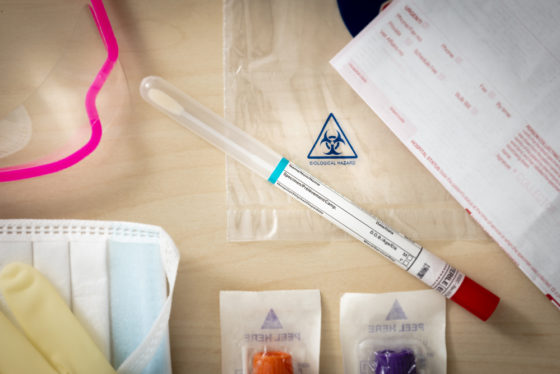Corona self-testing now official government advice: but are there risks?


The Dutch government has announced that people with mild cold symptoms can take a self-test for coronavirus, rather than being advised to get an official test immediately.
The new advice, based on recommendations from the Outbreak Management Team, follows weeks of reports of struggling coronavirus testing centres at maximum capacity.
People are advised that if their home test is positive, they should then make an appointment for a public health institute PCR test, so that the test is registered and contract tracing can commence. If not, they should still follow social distancing and handwashing advice, and test again the next day if symptoms continue or worsen.
Kitchen cupboard
Caretaker health minister Hugo de Jonge said in a statement: ‘It is good to know that self-tests now appear safe and trustworthy enough to use if you have symptoms…I hope that this means more people will choose to test themselves if they have symptoms. So make sure that you always have a few in your kitchen cupboard.’
But experts have told Dutch media that – even if the strategy is based on practicality – it comes with risks.
Richard Molenkamp, clinical molecular virologist at Erasmus MC hospital, told broadcaster NOS that less sensitive rapid lateral flow tests do have a risk of giving a false negative to someone who could then pass on coronavirus. Although the tests work well at the start of an infection, when the virus particles are abundant, the risk of a false negative is greater a few days later, he said.
Bert Niesters, professor in medical microbiology at the University of Groningen UMGG, told NOS that with very sick patients, the tests were likely to be accurate ‘but the problem is people with mild cold symptoms’.
Oversight
A global meta-analysis in March suggested that self-tests are most accurate in the first week after symptoms develop, identifying 78% of confirmed cases (compared with correctly ruling out coronavirus in around 99% of people who were indeed negative).
According to NU.nl, a Dutch study which was part of this analysis suggested that false negatives were more likely in people without symptoms but with a coronavirus infection – and although the OMT believes people largely do the test correctly, experts point out that the government is not looking over your shoulder to check you have put the stick far enough up your nose.
Some experts are concerned that there will be less monitoring of coronavirus infection levels with the new advice. Prof Louis Kroes, head of the department of medical microbiology at Leiden’s LUMC, told the Telegraaf that while the policy was practical, it was also ‘quite an adventure’ and would lead to some loss of oversight on infection levels, particularly if those who test positive do not then take an official GGD test.
Deaths
It is likely, however, that many people with coronavirus are not having GGD tests in any case. CBS experts have told DutchNews.nl that the fact that official ‘Covid patient deaths’ are dramatically less than death certificate records of people dying from Covid, suggests that not everyone is taking an official test. At the end of July this year, the government’s ‘Covid patient death rate’ (17,852) was 57% of the true death tally (31,573), according to CBS figures.
However, the RIVM public health institute’s behavioural institute still believes more infections will be discovered because it is much easier to test at home, reports NRC – and even more would be discovered if the home test kits were free, as in some other countries.
From next Monday, Dutch schools will receive 2.4 million self-tests, with the aim that all children in groups six to eight should test twice a week.
Thank you for donating to DutchNews.nl.
We could not provide the Dutch News service, and keep it free of charge, without the generous support of our readers. Your donations allow us to report on issues you tell us matter, and provide you with a summary of the most important Dutch news each day.
Make a donation